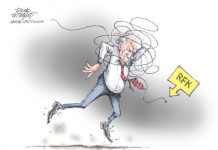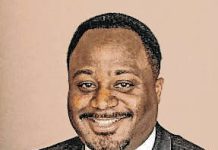As the Supreme Court recently heard arguments last week over a program that protects immigrants who entered this country illegally as children, the fate of almost 700,000 is still in limbo.
The high court heard the Trump administration’s appeals of lower court rulings that blocked the president’s 2017 plan to rescind DACA, Deferred Action for Childhood Arrivals. The Obama-era program, which shields people who were brought to the United States as children from deportation, was intended as a stopgap measure, and didn’t provide a pathway to citizenship. But Congress has failed to act on the issue.
The lower courts ruled Trump violated a U.S. law called the Administrative Procedure Act, which requires policy changes be done in an orderly way, in seeking to rescind DACA.
The president once said that he looked forward to working with Republicans and Democrats to “resolve the DACA issue with heart and compassion — but through the lawful democratic process.”
He recently described Dreamers as “hardened criminals” in a tweet. As the New York Times noted in a story, anyone with a serious criminal history — defined as a felony or serious misdemeanor conviction, or three misdemeanor convictions — is ineligible to be a DACA recipient.
In fact, Dreamers are young people who know no other country but America. And in the sweeping and chaotic debate, it’s easy to overlook the individuals whose lives are being affected. They are students pursuing their education, they are workers contributing to economic growth. And they are our neighbors.
A reminder of this came earlier this year, in a Tribune story about two young men who grew up in Bremen and Bristol, and became part of a Grammy-winning project while attending Indiana University South Bend. Salvador Perez Lopez and Juan-Carlos Alarcon were among 53 musicians and Dreamers who played for an album titled “American Dreamers: Voices of Hope, Music of Freedom.”
Alarcon told The Tribune: “We live among our neighbors. We go to school. We’ve lived here for years. We just want to make a difference.”
Instead their lives — and the lives of other Dreamers — are in turmoil. They have been failed by lawmakers and by a president who has at turns demonized and expressed sympathy for them. All this despite what was once widespread, bipartisan support for providing protection and a pathway to citizenship. Consider that the first Dream Act legislation was introduced in 2001.
Now the Dreamers await a decision from the high court, which is expected by June. They deserve better.
This editorial was written by the South Bend Tribune. Send comments to [email protected].




